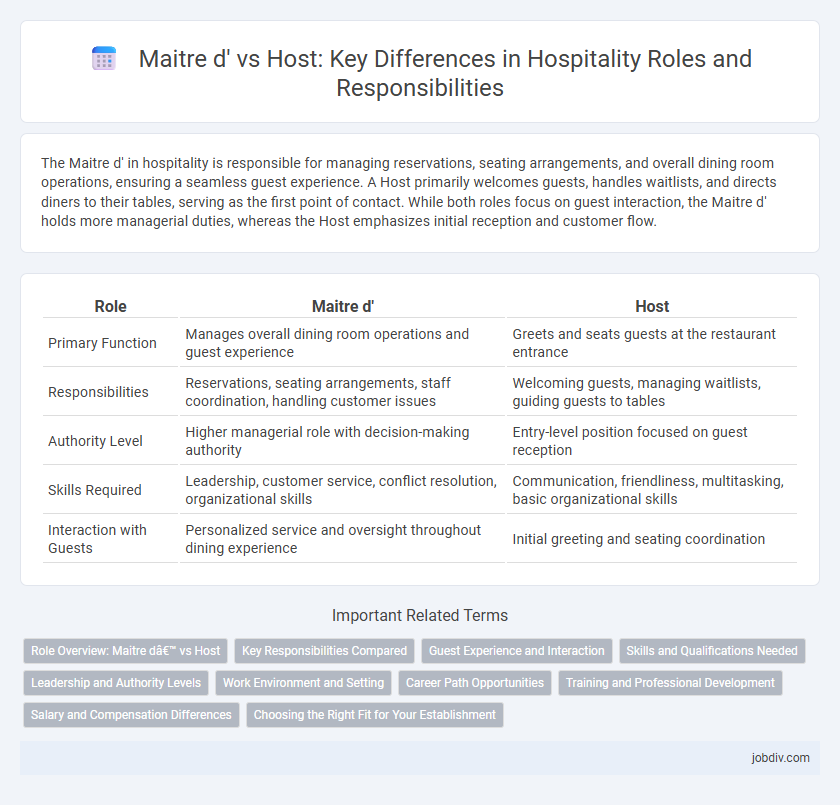The Maitre d' in hospitality is responsible for managing reservations, seating arrangements, and overall dining room operations, ensuring a seamless guest experience. A Host primarily welcomes guests, handles waitlists, and directs diners to their tables, serving as the first point of contact. While both roles focus on guest interaction, the Maitre d' holds more managerial duties, whereas the Host emphasizes initial reception and customer flow.
Table of Comparison
| Role | Maitre d' | Host |
|---|---|---|
| Primary Function | Manages overall dining room operations and guest experience | Greets and seats guests at the restaurant entrance |
| Responsibilities | Reservations, seating arrangements, staff coordination, handling customer issues | Welcoming guests, managing waitlists, guiding guests to tables |
| Authority Level | Higher managerial role with decision-making authority | Entry-level position focused on guest reception |
| Skills Required | Leadership, customer service, conflict resolution, organizational skills | Communication, friendliness, multitasking, basic organizational skills |
| Interaction with Guests | Personalized service and oversight throughout dining experience | Initial greeting and seating coordination |
Role Overview: Maitre d’ vs Host
The Maitre d' manages the overall dining experience, overseeing reservation systems, coordinating between kitchen and waitstaff, and ensuring smooth table turnover in high-end restaurants. The Host primarily greets guests, manages the waiting list, and escorts diners to their tables, focusing on first impressions and efficient seating. Both roles require excellent customer service skills, but the Maitre d' holds greater responsibility for operational flow and guest satisfaction management.
Key Responsibilities Compared
The Maitre d' oversees the formal dining experience by managing reservations, coordinating service staff, and ensuring seamless communication between the kitchen and front-of-house teams. The Host primarily handles guest greetings, seating arrangements, and waitlist management to optimize table turnover and enhance first impressions. Both roles focus on guest satisfaction but differ in scope, with the Maitre d' playing a leadership role in service operations and the Host concentrating on guest reception and flow control.
Guest Experience and Interaction
The Maitre d' orchestrates the dining experience by managing reservations, seating, and personalized guest interactions to ensure seamless service flow. Hosts primarily focus on greeting guests and managing waitlists, creating the initial impression that sets the tone for the visit. Effective collaboration between the Maitre d' and host enhances overall guest satisfaction by combining efficient operational management with warm, attentive hospitality.
Skills and Qualifications Needed
A Maitre d' requires extensive knowledge of fine dining protocols, exceptional leadership, and impeccable customer service skills to manage restaurant operations efficiently. Hosts must excel in communication, multitasking, and guest relations, ensuring smooth seating arrangements and a welcoming atmosphere. Both roles demand strong interpersonal abilities, but the Maitre d' often holds advanced training in hospitality management or culinary arts.
Leadership and Authority Levels
The Maitre d' holds a higher level of leadership and authority within hospitality settings, overseeing the entire dining experience, managing staff, and ensuring service excellence. The Host primarily manages guest greetings and seating arrangements with limited supervisory responsibilities. Both roles contribute to guest satisfaction, but the Maitre d' exercises comprehensive control over service operations and team coordination.
Work Environment and Setting
The Maitre d' typically operates in upscale dining establishments, managing the dining room's atmosphere and coordinating service to ensure a seamless guest experience. Hosts often work in a broader range of hospitality settings, including casual restaurants and hotels, where they manage guest arrivals and seating arrangements. Both roles require strong interpersonal skills, but the Maitre d' is more involved in supervising staff and maintaining service standards within a formal dining environment.
Career Path Opportunities
Maitre d' roles in hospitality often lead to advanced managerial positions such as restaurant manager or food and beverage director, emphasizing leadership and operational expertise. Hosts typically focus on guest relations and front-of-house coordination, providing a foundation for careers in customer service management or event planning. Both career paths offer opportunities for growth, but the Maitre d' position generally opens doors to higher-level executive roles within the hospitality industry.
Training and Professional Development
Maitre d's receive specialized training in fine dining service, leadership, and guest interaction, emphasizing precision and etiquette to enhance luxury hospitality experiences. Hosts undergo foundational training focused on guest reception, reservation management, and customer service skills to ensure smooth front-of-house operations. Professional development for Maitre d's often includes advanced workshops and certifications in restaurant management, while hosts benefit from training in communication and teamwork to prepare for potential career advancement.
Salary and Compensation Differences
Maitre d' positions in hospitality typically offer higher salaries than hosts due to greater responsibilities in managing dining operations and customer service quality. According to industry data, the average annual salary for a Maitre d' ranges from $40,000 to $60,000, while hosts usually earn between $25,000 and $35,000. Compensation packages for Maitre d's often include bonuses, tips, and benefits, reflecting their leadership role compared to the more entry-level host positions.
Choosing the Right Fit for Your Establishment
Selecting between a Maitre d' and a Host depends on the size and style of your hospitality establishment; a Maitre d' typically manages fine dining operations and supervises staff, enhancing guest experience with personalized service. In contrast, a Host primarily handles guest greetings and seating arrangements, making them ideal for casual or high-volume settings where efficiency is key. Understanding your establishment's demands ensures the chosen role optimizes both service quality and operational flow.
Maitre d’ vs Host Infographic

 jobdiv.com
jobdiv.com